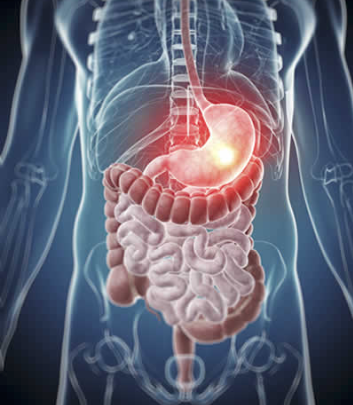Ann Scheimann, M.D., M.B.A.
Dr. Scheimann is a Gastroenterologist and expert on PWS. Ann is a PWSA (USA) medical consultant on PWS Gastrointestinal (GI) issues.
The prevalence of GI issues in persons with PWS of all ages is quite high. In addition to early feeding difficulties, reflux and aspiration symptoms are frequent problems in infancy. Problems with digestion affect approximately 35% of adults; constipation and diarrhea problems occur in 20-35%. Gastroesophageal reflux disease, GERD, is common.
Dr. Scheimann outlined suggestions to treat GERD in infants: use thickened feedings, avoid overfeeding, use more prone positioning, and eliminate all exposure to tobacco smoke. For older children and adults she recommended: avoid lying down after eating a meal, elevate the head of the bed, lose weight, avoid all tobacco, and avoid foods and medications that may cause reflux. Fundoplication is a surgical option when lifestyle changes and medications aren’t enough.
Oral problems are common, including small mouths causing teeth crowding and enamel erosion. Salivary flow is generally far less than normal [dry mouth products such as Biotene can be helpful]. Factors predisposing someone to choking, a serious and not uncommon occurrence in persons with PWS, include hyperphagia (high drive for food), thick saliva, weak pharyngeal muscles, and reflux. Use of the “pace and chase technique for liquid consumption with meals is helpful in preventing the symptoms of esophageal dysphagia and choking. Dr. Scheimann advises all care providers to learn the Heimlich maneuver, treat reflux and gastritis symptoms, encourage chewing during meals, and, of course, supervise persons with PWS at all times.
Risk factors for developing gallstones, also not uncommon, include obesity, low fiber/high fat diet, and diabetes mellitus. 70-80% of normal adults in one study had no biliary symptoms when their gallstones were detected- the majority of healthy adults did not require treatment for gallstones unless symptoms arose such as right sided abdominal pain or pain after meals.
Constipation and encopresis (involuntary fecal soiling) are common problems. Factors that add to constipating conditions include developmental factors (cognition, genetics, fluid intake, etc.) and alter anatomy (low muscle tone, malrotation, etc.). Rectal ulcers can occur when there is chronic constipation. General guidelines to treat constipation in infancy include the careful use of glycerin suppositories or softening agents such as Karo syrup and the increase of fiber intake when solids are introduced. She cautioned against using enemas, suppositories and finger dilations unless recommended by the physician. For the school age child and adult, her suggestions included a cooked fiber-rich diet plus water and the continuous use of medications, such as Miralax with appropriate amounts of fluid on a daily basis rather than intermittent dosing.
Gastric motility (the rate at which the stomach empties) and an impaired vomit reflex (controlled by the central nervous system) contribute to serious stomach expansion and stomach rupture problems that can cause death. Warning signs and immediate hospitalization or ER evaluation for potential gastric rupture or gastric necrosis included a binge eating episode followed by abdominal discomfort, recent history of gastritis or ulcer.
While a variety of bariatric surgery techniques have been attempted in persons with PWS, the long-term results have been very poor. Research continues to explore viable treatment options, but bariatric surgery is not currently one of them.
Updated and reviewed by Dr. Scheimann on July 30, 2019





 Jennifer Bolander has been serving as a Special Education Specialist for PWSA (USA) since October of 2015. She is a graduate of John Carroll University and lives in Ohio with her husband Brad and daughters Kate (17), and Sophia (13) who was born with PWS.
Jennifer Bolander has been serving as a Special Education Specialist for PWSA (USA) since October of 2015. She is a graduate of John Carroll University and lives in Ohio with her husband Brad and daughters Kate (17), and Sophia (13) who was born with PWS. Perry A. Zirkel has written more than 1,500 publications on various aspects of school law, with an emphasis on legal issues in special education. He writes a regular column for NAESP’s Principal magazine and NASP’s Communiqué newsletter, and he did so previously for Phi Delta Kappan and Teaching Exceptional Children.
Perry A. Zirkel has written more than 1,500 publications on various aspects of school law, with an emphasis on legal issues in special education. He writes a regular column for NAESP’s Principal magazine and NASP’s Communiqué newsletter, and he did so previously for Phi Delta Kappan and Teaching Exceptional Children. Evan has worked with the Prader-Willi Syndrome Association (USA) since 2007 primarily as a Crisis Intervention and Family Support Counselor. Evans works with parents and schools to foster strong collaborative relationships and appropriate educational environments for students with PWS.
Evan has worked with the Prader-Willi Syndrome Association (USA) since 2007 primarily as a Crisis Intervention and Family Support Counselor. Evans works with parents and schools to foster strong collaborative relationships and appropriate educational environments for students with PWS. Dr. Amy McTighe is the PWS Program Manager and Inpatient Teacher at the Center for Prader-Willi Syndrome at the Children’s Institute of Pittsburgh. She graduated from Duquesne University receiving her Bachelor’s and Master’s degree in Education with a focus on elementary education, special education, and language arts.
Dr. Amy McTighe is the PWS Program Manager and Inpatient Teacher at the Center for Prader-Willi Syndrome at the Children’s Institute of Pittsburgh. She graduated from Duquesne University receiving her Bachelor’s and Master’s degree in Education with a focus on elementary education, special education, and language arts. Staci Zimmerman works for Prader-Willi Syndrome Association of Colorado as an Individualized Education Program (IEP) consultant. Staci collaborates with the PWS multi-disciplinary clinic at the Children’s Hospital in Denver supporting families and school districts around the United States with their child’s Individual Educational Plan.
Staci Zimmerman works for Prader-Willi Syndrome Association of Colorado as an Individualized Education Program (IEP) consultant. Staci collaborates with the PWS multi-disciplinary clinic at the Children’s Hospital in Denver supporting families and school districts around the United States with their child’s Individual Educational Plan. Founded in 2001, SDLC is a non-profit legal services organization dedicated to protecting and advancing the legal rights of people with disabilities throughout the South. It partners with the Southern Poverty Law Center, Protection and Advocacy (P&A) programs, Legal Services Corporations (LSC) and disability organizations on major, systemic disability rights issues involving the Individuals with Disabilities Education Act (IDEA), Americans with Disabilities Act (ADA), and the federal Medicaid Act. Recently in November 2014, Jim retired.
Founded in 2001, SDLC is a non-profit legal services organization dedicated to protecting and advancing the legal rights of people with disabilities throughout the South. It partners with the Southern Poverty Law Center, Protection and Advocacy (P&A) programs, Legal Services Corporations (LSC) and disability organizations on major, systemic disability rights issues involving the Individuals with Disabilities Education Act (IDEA), Americans with Disabilities Act (ADA), and the federal Medicaid Act. Recently in November 2014, Jim retired.